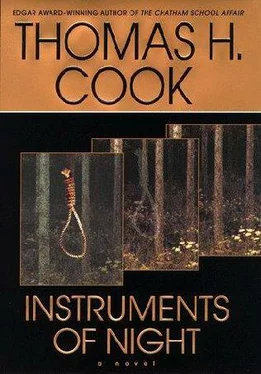Thomas Cook - Instruments of Night
Здесь есть возможность читать онлайн «Thomas Cook - Instruments of Night» весь текст электронной книги совершенно бесплатно (целиком полную версию без сокращений). В некоторых случаях можно слушать аудио, скачать через торрент в формате fb2 и присутствует краткое содержание. Жанр: Триллер, на английском языке. Описание произведения, (предисловие) а так же отзывы посетителей доступны на портале библиотеки ЛибКат.
- Название:Instruments of Night
- Автор:
- Жанр:
- Год:неизвестен
- ISBN:нет данных
- Рейтинг книги:3 / 5. Голосов: 1
-
Избранное:Добавить в избранное
- Отзывы:
-
Ваша оценка:
- 60
- 1
- 2
- 3
- 4
- 5
Instruments of Night: краткое содержание, описание и аннотация
Предлагаем к чтению аннотацию, описание, краткое содержание или предисловие (зависит от того, что написал сам автор книги «Instruments of Night»). Если вы не нашли необходимую информацию о книге — напишите в комментариях, мы постараемся отыскать её.
Instruments of Night — читать онлайн бесплатно полную книгу (весь текст) целиком
Ниже представлен текст книги, разбитый по страницам. Система сохранения места последней прочитанной страницы, позволяет с удобством читать онлайн бесплатно книгу «Instruments of Night», без необходимости каждый раз заново искать на чём Вы остановились. Поставьте закладку, и сможете в любой момент перейти на страницу, на которой закончили чтение.
Интервал:
Закладка:
But this time the dream had emerged not from his own past, but Riverwood’s, engendered, he thought now, by Eleanor’s suggestion that he fashion a play of it. For the people of Riverwood had come out of his sleep not as fully realized individuals, but like actors from behind a black curtain, their roles not yet determined despite their presence on the stage.
He made a cup of coffee and walked out onto the porch. To the left he could see Eleanor’s cottage, obscured by the early morning fog, the lights still out. He remembered their talk of the night before, how she’d watched him knowingly, as if she’d seen his dreadful secret nakedly exposed. What amazed him now was that he hadn’t instantly gotten to his feet, fled to the safety of his own solitary cabin. Instead, he’d remained on the porch for a time, chatting quietly about his books, enjoying the interest she showed in them, the piercing intelligence she brought to everything. Even now he found that he had no wish to avoid her. In fact, he was already looking forward to their next meeting, the small, trembling pleasure he took in her company.
The fact that it would be a brief pleasure, that it would end with summer, when both of them left this place, was not one Graves wanted to dwell upon. He quickly finished the coffee, showered, dressed, and made his way up to his office in the main house.
Saunders had just come out of the boathouse when he neared the bottom of the stairs, showing up without warning, just as he had the morning before, so that Graves had the uncomfortable sense that he was always being watched, perhaps even followed, Saunders the secret agent, directed by some as yet invisible hand.
“Good morning, Mr. Graves.” Saunders was wearing a light blue short-sleeved shirt, his arms smooth, tanned, unusually muscular for a man in his late sixties. Graves imagined him as he must have looked in the summer of 1946, a handsome, athletic boy who’d watched Faye Harrison and Allison Davies with the longing common to his age. Earlier, Graves had injected a murderous quality into that longing. But now he imagined it differently, as something quiet, almost melancholy. The youthful Saunders as a boy who’d learned his place early and always kept it, Allison and Faye so utterly beyond his grasp he’d had no thought of striving for them.
With no further word Saunders headed up the stairs, Graves following along at his side. At the top he stopped and faced Graves once again. “You know, Faye wasn’t the only pretty girl here at Riverwood that summer,” he said. “Mona Flagg was just nineteen. Beautiful. Hair like sunlight.” A curious sadness settled over his face. “I always felt sorry for Mona. From the wrong side of the tracks, you know. Studying to be a nurse.” He glanced back to Graves. “Edward was crazy about her. Wanted to marry her.”
“Did he?”
“No,” Saunders said. “Something broke them up at the end of that summer.”
A dark possibility pierced Graves’ mind. “Could it have been Faye Harrison?”
Saunders looked surprised by the question. “I don’t know,” he said. “I sometimes saw Mona and Faye together.” He brought his attention back from the pond. “Such a pretty girl, Mona was. Smart too. Lively. You know the land. The type you’d die for.”
Graves nodded silently. Or kill for? his mind asked.
Graves turned to Detective Portman’s notes on the interviews he’d conducted with the people of Riverwood during the initial stage of his murder investigation. As he read, separate personalities began to emerge. Substance replaced shadow. The veneer of stateliness and harmony slowly peeled away from Riverwood as the characters, however grudgingly, began to reveal the edgy conflict that had no doubt marked their lives.
In Mrs. Davies, Graves detected the calculated reserve of one who, more than anything, feared embarrassment, a stern woman with a fierce temperament she held firmly in check, the sort who could grow irritated with an old detective’s questions, show that irritation in her voice alone:
PORTMAN: And where were you that day?
MRS. DAVIES: I presume you mean the day Faye Harrison disappeared.
PORTMAN: yes.
MRS. DAVIES: Well, I was in the library most of the time. Sitting for my portrait. Mr. Grossman was with me. He is the portraitist.
PORTMAN: You spent the whole day in the library with Mr. Grossman?
MRS. DAVIES: Yes, I did. My husband came in at one point. So did my daughter. But otherwise, we remained uninterrupted.
PORTMAN: Did you see Faye Harrison at all?
MRS. DAVIES: No, I didn’t. As I said, I was in the library most of the day. Sitting for my portrait. Faye may have passed by the window, but if she did, I didn’t see her. When one sits for a portrait, one faces the artist. It is not helpful to glance about.
PORTMAN: How well did you know Faye?
MRS. DAVIES: Not very well. My husband had more dealings with the girl.
PORTMAN: Dealings?
MRS. DAVIES: She worked for my husband. Of course, it was probably Allison who knew her best. They were the same age.
PORTMAN: Were they friends? Allison and Faye?
MRS. DAVIES: I don’t know how close they were.
Graves sat back, thinking. Was that really true, he wondered. Had Mrs. Davies never gathered that Allison and Faye had grown very close over the years? It was a tiny misstatement, the sort Slovak seized upon, then traced to its dark core. Graves tried to do the same, but found no route through the maze, and so began to read again, now effortlessly converting Portman’s solidly detailed notes into small dramatic scenes.
PORTMAN: Mrs. Davies, did you ever see Faye talking to Jake Mosley?
MRS. DAVIES: No.
PORTMAN: Did Allison ever mention Jake?
MRS. DAVIES: Why would my daughter ever mention such a person?
PORTMAN: Well, Faye and Jake were seen in the woods together at the same time, so I’m trying to determine if there might have been some relationship between them.
MRS. DAVIES: The whereabouts of Mr. Mosley would never have been any concern of mine.
The scene grew more detailed in Graves’ mind. Portman’s enormous frame slouched in a brocade chair, Mrs. Davies seated opposite him, staring coolly into the veteran detective’s hard, unblinking eyes. He could almost hear Portman’s voice, impassive, methodical, relentlessly burrowing toward a truth whose dark malignancy he scarcely wished to discover, a voice, Graves realized, like Slovak’s.
PORTMAN: Was Jake Mosley often hired to work here at Riverwood?
MRS. DAVIES: No, he was not.
PORTMAN: Had he ever worked here before?
MRS. DAVIES: Not to my knowledge. That is Mr. Garrett’s affair. He was in charge of the workmen.
PORTMAN: Well, Mr. Garrett has said that it was Mr. Davies who hired Jake.
Graves recognized that even at this early stage of his investigation, the old detective had already begun to look for the same small discrepancies that Slovak tirelessly sought, an insight that propelled Graves’ imagination to add the first vague hint of suspicion to the voice he’d now fully imagined for Dennis Portman.
MRS. DAVIES: The people who work for my husband are not my affair. I have nothing to do with it. Mr. Davies has his own… way of… handling them.
PORTMAN: You’re not involved in the daily running of Riverwood, then?
MRS. DAVIES: NO. Never. It has nothing to do with me.
Graves studied the last few lines of Portman’s notes. Mrs. Davies’ language struck him as odd, the way she talked simultaneously of “them” and “it,” merging the personal pronoun (people) with the process of administering Riverwood (it). It was a curious syntax, and although there was no mention of it in Portman’s notes, Graves saw the old detective’s eyes narrow as he peered into Mrs. Davies’ face. A moment of silence would have fallen between them, he thought, an interval during which these two would have faced each other in the gray light that filtered through the windows of the library on such a summer afternoon, and which lasted until Portman brought it to an end with another question.
Читать дальшеИнтервал:
Закладка:
Похожие книги на «Instruments of Night»
Представляем Вашему вниманию похожие книги на «Instruments of Night» списком для выбора. Мы отобрали схожую по названию и смыслу литературу в надежде предоставить читателям больше вариантов отыскать новые, интересные, ещё непрочитанные произведения.
Обсуждение, отзывы о книге «Instruments of Night» и просто собственные мнения читателей. Оставьте ваши комментарии, напишите, что Вы думаете о произведении, его смысле или главных героях. Укажите что конкретно понравилось, а что нет, и почему Вы так считаете.












